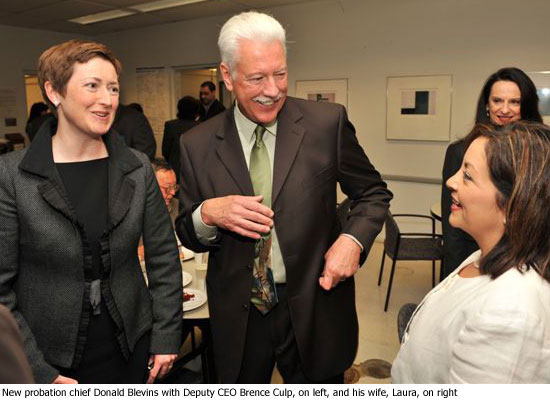New probation chief vows reform and innovation
April 15, 2010
Donald Blevins, Los Angeles County’s newly named probation chief, is under no illusions. He knows that, beginning Monday, he’s taking control of a seriously troubled organization, one that’s been under fire for everything from bad budgeting to allegedly abusive behavior towards its juvenile charges.
“My assessment is that it’s a department that’s been good at saying what they are going to do and terrible at following through,” he says, adding that this lack of accountability “is going to stop here in a hurry.”
In the past, Blevins says, “the department hasn’t had strong enough leadership from the top on down.” He says he aims to fix that by moving managers out of areas that are failing. And if that doesn’t work, he says he’ll do what he did in his last job as the head of Alameda County’s probation department.
“I encouraged a few people to retire,” he says.
In Los Angeles, the job is likely to be a lot tougher, simply given the size of the Probation Department, the nation’s largest, with 58,000 adults and about 20,000 juveniles in the system. The department has a workforce of 6,100 employees and a budget of $693 million.
In recent years, most of the criticism leveled at the department has involved its operation of juvenile halls and camps.
The U.S. Justice Department in 2008 concluded that the Probation Department had failed to provide adequate mental health for juveniles in its custody and to report and investigate allegations of abuse—situations probation officials are working to correct. The American Civil Liberties Union, meanwhile, alleged in a suit earlier this year that educational programs at Camp Challenger in Lancaster were so inadequate that functionally illiterate juveniles were being given high-school degrees.
More recently, the Probation Department’s interim chief, Cal Remington, disclosed that internal affairs had a backlog of over 150 unfinished misconduct investigations. Blevins, who praised Remington’s brief stewardship of the department, said he has agreed to stay as Blevins’ No. 2 for at least a month.
In a get-to-know-you meeting last week with managers, Blevins said he had “zero tolerance” for abuse and warned that staff members who mistreat those in custody will be fired or punished. He hopes better training might help the staff find ways to defuse tense situations before they turn violent.
Blevins, 58, was hired because he was seen not only as a tough manager but as someone with creative solutions to difficult problems, a reputation he says comes from having “literally worked every job there is” in a probation career spanning 35 years.
In nearly seven years as Alameda’s probation chief, Blevins helped transform the $96 million department with a staff of 650 in an era of tight budgets. He oversaw construction of a state-of-the-art juvenile hall, created “evidence-based” programs, improved psychological and medical services and launched innovative transitional programs to help juvenile offenders successfully return to home and school.
“I think he’s a person who showed great leadership,” says Alameda County Board of Supervisors President Alice Lai-Bitker. “He was very collaborative in working with the other departments to improve services.”
Added Carol Biondi, an influential member of the L.A. County Commission for Families and Children: “I hope he is as forward thinking here as he was in Alameda.”
Blevins, who’ll be confronted with a budget deficit estimated at about $50 million, vows to hit the ground running, immediately working to clear the backlog of internal affairs cases and pressing county education officials to add more permanent teachers to the programs they run for juveniles.
“My goal is to make sure that this department becomes a leader and not a follower in innovative practices,” Blevins says. “We need to become the most innovative department in the state of California.”
Blevins, who is still unpacking boxes at a new house in Huntington Beach with his wife, Laura, appears unfazed by the challenges that have bedeviled his predecessors.
“I look at it as the opportunity of a lifetime to be able to run a department this size,” he says. “I think I’m ready for the challenge, and I think I’ll do a good job.”













 405 bridge work causes a stink
405 bridge work causes a stink
